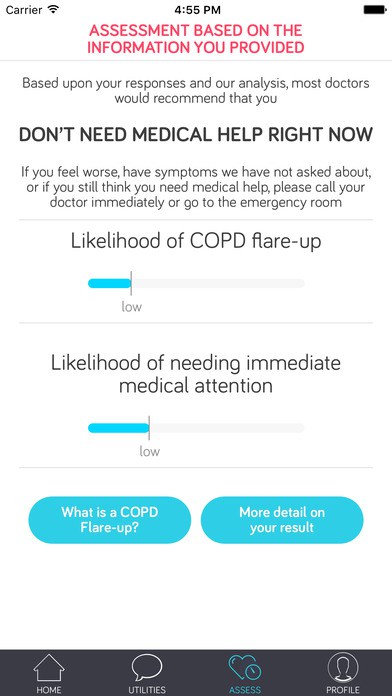 Humana has tapped Crestwood, Kentucky-based Revon Systems for a market-wide pilot of the latter’s mobile self-triage platform, the Revon Smart Symptom Tracker. The program aims to help a select population of Medicare Advantage members with chronic obstructive pulmonary disease (COPD) better assess day-to-day variations in their symptoms.
Humana has tapped Crestwood, Kentucky-based Revon Systems for a market-wide pilot of the latter’s mobile self-triage platform, the Revon Smart Symptom Tracker. The program aims to help a select population of Medicare Advantage members with chronic obstructive pulmonary disease (COPD) better assess day-to-day variations in their symptoms.
“COPD is characterized by exacerbation, and patients who have this disease are often confused and anxious about the seriousness of their symptoms,” Ted Smith, CEO of Revon Systems, told MobiHealthNews. “That’s increased cough, that’s a change in the color of sputum, that’s a reduction in their oxygen saturation — there’s many, many things that can change for someone who has this disease. It’s not unusual for those things to change a little bit over time, but every now and then they change a lot and often patients go to the hospital concerned about how serious their situation is.”
Revon’s self-triage software platform is specifically designed for chronic diseases that can unexpectedly flare and worsen, Smith said. Using a pulse oximeter and thermometer provided to pilot participants, the app asks users simple questions about their symptoms and biometrics. These are fed to five independent algorithms that have been trained to mimic the triage decisions of board-certified pulmonologists, whose consensus is then returned to the user.
“Each algorithm mirrors the decision-making of that pulmonologist, and then we have a parent algorithm that delivers the consensus opinion of all five,” Smith explained. “So, what a patient who is using the application is getting is the decision-making of a panel of board-certified pulmonologists looking at their situation.”
Providing patients with feedback about the severity of their flare ups not only offers them peace of mind, but it could prevent the costs that come with unnecessary emergency room visits. As such, Smith said that he could see Revon’s service attracting the interest of other health systems as well.
“You have a lot of people doing Google searches, and not being sure if they need to talk to somebody or not,” he said. “There’s a fair amount of hesitation about what to do when you’re not feeling well. Many payers would like to provide as many resources as possible to help patients at home learn more about their condition, and hopefully make better decisions about whether they need to meet with a doctor, go to an emergency room, or get some rest and check back later.”
The COPD use case stands as Revon’s first validated algorithm, Smith said, but other chronic diseases that involve flare-ups are not off the table. For instance, last month Revon announced another partnership with ClinTec International. This year-long study program will be conducted in the UK, and will allow patients with a rare blood disease to gauge and report their systems through Revon’s platform and integrated Misfit Wearables’ activity trackers.















